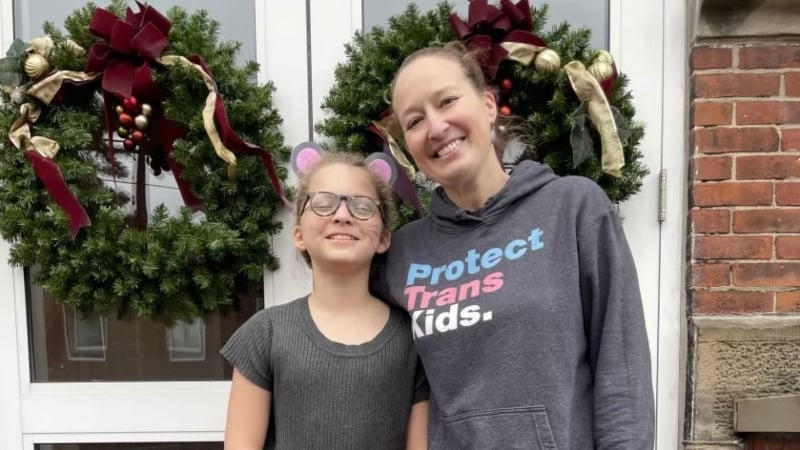
by Jeff St. Clair
Lawmakers this month passed House Bill 68, which bans gender-affirming health care for transgender minors and forbids trans girls from playing on girls’ and women’s scholastic sports teams.
Gov. Mike DeWine has yet to sign the bill.
Dani Beale and her family, including 12-year-old trans daughter Blaze, left Ohio for Western New York because of what they see as the anti-trans actions of Ohio lawmakers.
Beale said her family felt it had no choice but to leave when Republican lawmakers introduced legislation that became HB 68 earlier this year.
“We started to see the language in the bills and we realized that we weren’t going to have a choice about it if we were going to be taking care of our kid in the way that we think is necessary for her,” Beale said.
“The moment came for me was when Blaze said, ‘I don’t want to live in a state that doesn’t want me.’ That really got me when she said those words out loud,” she said.
Blaze said she and other trans people feel targeted by lawmakers.
“This has been blown way out of proportion. It’s like 2% of people are trans,” she said. “It’s not affecting a lot of people, but the people that it is affecting, it’s affecting them so much.
Medical care the chief concern
The Saving Adolescents from Experimentation Act, or SAFE Act, bans gender-affirming healthcare, including puberty blockers and hormone replacement therapies. Critics say it also effectively bans counseling for trans youth. That act was combined in HB 68 with the Save Women’s Sports Act, which bans trans girls from girls’ and women’s scholastic sports.
Among other restrictions currently under consideration in Ohio is the so-called bathroom bill, which would block students from using restrooms or locker rooms designated for other than the sex registered on their birth certificate.
“Each of those are, in different ways, discriminatory toward my child. But, ultimately, for us, it was the medical care,” Beale said. “We needed to make sure she could get medical care and we needed to make sure that we wouldn’t be penalized or be at risk of being able to parent our kid, and in a state like Ohio, it seems like that could be a problem for us.”
Beale and other advocates cite the National Institutes of Health, the American Medical Association, and numerous other groups that support gender-affirming care, which they say has been safely used for decades.
Beale said it’s the right treatment for Blaze.
“What puberty blockers do is basically let you hit pause and it just stops puberty from happening and gives us a few more years to talk with her, for her to grow up and feel her way into herself and be sure this is what we want to do,” she said.
Beale and her family chose Western New York because the state does not have such restrictive laws.
“People can have their opinions about what we do as parents or what we think is OK with our kid, but crossing the line into legislating for what I, as a parent, can choose for my child is a major problem for me, especially in a state where parents’ rights are considered to be really important to a lot of people, but we are not the parents who they want to allow to have rights,” Beale said.
The politics of gender
Blaze knew early that she was a girl.
“I would say since I could think, I’ve known that I wasn’t really meant to be a boy,” she said.
But she’s not preoccupied with gender.
“Being trans or being LGBTQ has never been my personality,” she said. “I play the euphonium, I’m on a basketball team, I used to be on a jump rope team, those are the things I want people to think about when they see me, not the fact that I used to be a boy because it doesn’t matter.”
She believes the legislature is so focused on the politics of gender that they’ve missed her humanity.
“I wish they could see past my name and past my gender and look deep and see that I’m not just a trans girl,” she said. “I am just a human.” 🔥
The Buckeye Flame is an online platform dedicated to amplifying the voices of LGBTQ+ Ohioans to support community and civic empowerment through the creation of engaging content that chronicles their triumphs, struggles, and lived experiences.
This piece was originally published with Ideastream Public Media and appears here with permission.



